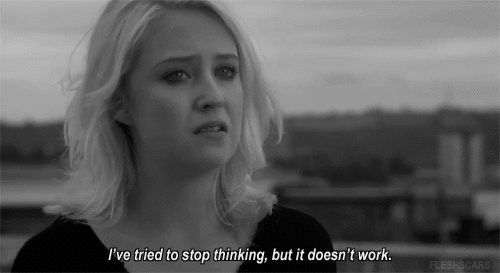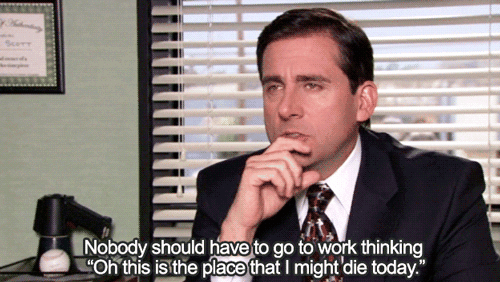How to Disconnect from Work
It’s 9 PM. Your laptop’s closed and your body’s home, but your mind? Still in that damn meeting, still running through to-dos, and re-editing that one email you sent.
You want to shut off. But you feel like you haven’t earned it, there’s more to-do.
You’re exhausted; but wired.
Welcome to the high-performer spiral...
What does this mean for you?
Your #1 priority when you’re not working is to emotionally detach.
It’s not just the hours you’re working. It’s the hours you spend thinking about work.
→ The spiraling.
→ The worst-case ruminating.
→ The guilt for not doing more.
That’s what’s keeping you ‘ON’ 😵💫
So before we talk about having a “life outside of work”... we need to get your mental and emotional energy back.
That starts with regulation; not adding more to your to-do list.
To accomplish this you have 3 key areas to focus on:
- Clearing subconscious fears 🪄
- Daily closure rituals 💆🏼
- Life outside of work 💃🏼
We'll explore each of these aspects individually, so you can implement actionable steps today!
Part 1/1
Clearing subconscious fears
Your brain thinks overworking = safety.
But that pattern? It’s not your truth.
It’s a leftover survival strategy your subconscious clings to.
❌ You don’t need to try harder.
☑️ You need to teach your subconscious that you’re safe even when you're not proving something.
Let’s break this down:
Most high performers share a set of habits that got them far, but are now burning them out:
- Perfectionism
- Overcommitting
- People-pleasing
It’s not random. These behaviors created success and your subconscious now sees them as beneficial.
So now what happens?
You chase that dopamine hit from “good job!”
You overdeliver to feel worthy.
You stay ON because slowing down feels like falling behind.
Every time you try to stop, that voice kicks in:
“What if I miss something?”
“What if I fall behind?”
“What if it’s an emergency—who’s going to handle it?!”
Your mind thinks that voice is protection.
Your subconscious isn’t trying to ruin your peace—it’s trying to keep you safe.
It just doesn’t realize that this way of living is burning you out.
❗️You’re not being chased by a lion.
It’s just a meeting.
Just a client.
Just a business.
🤔 So how do we change it?
We build a new “safe.”
1. Start imagining the life you want.
Your subconscious doesn’t know the difference between real and imagined.
Every time you say “I’m too busy” or “I’m a people pleaser,” your brain scans for evidence to prove that true.
Flip the script.
What does a day in the life of “Balance” feel like?
Don't list what it isn’t. Instead, describe:
- Waking up grounded.
- Moving through your day clear, calm, and collected.
- Feeling done at the end of the day.
- Speaking with certainty.
- Finishing work without spinning out.
Your nervous system needs to feel that before it can trust it.
2. Replace old habits with new rituals.
Repetition rewires your brain.
The more you act from a state of calm, the more your subconscious believes calm is safe.
Let those micro-habits become your new baseline.
3. Be specific. Very specific.
Vague goals like “I need better boundaries” don’t work. Instead try:
“I’m going to stop responding to messages after 6pm. I’ll set this with my manager tomorrow, and update my Slack settings today.”
That’s reprogramming.
📝 Do this now
Pick 1 habit you want to shift.
Turn it into a S.M.A.R.T. goal (Specific, Measurable, Achievable, Relevant, Time-bound).
Write it down. It should be small, but intentional.
Part 2/3
Applying daily closure rituals
Unfinished tasks don’t disappear when your laptop closes.
They linger.
And if your brain’s been trained to equate productivity with safety, they’ll haunt you into the night.

You don’t disconnect by walking away.
You disconnect by training your nervous system to feel safe shutting down.
A to-do list isn’t the problem.
It’s the belief that if you don’t finish everything, you don’t deserve to rest.
A daily closure ritual is NOT:
❌ Logging off at a “reasonable hour”
❌ Putting yourself on Do-Not-Disturb
❌ Leaving the office
It’s not that those are wrong.
They’re just surface-level steps.
Real disconnection comes from inner closure, not outer boundaries.
How to do it:
Prioritize
Identify your top 1–3 priorities. Break quarterly goals into weekly + daily tasks. Anything outside that? Not urgent.
Plan
At the end of the day, write where you left off and your first task for tomorrow. This offloads mental clutter and gives your brain permission to let go.
Productivity
Use your most focused hours for deep work. Save low-effort tasks for low-energy windows. Avoid hard tasks late in the day; that’s what follows you home.
Personal time
When you’re off… be off.
Work convos at dinner don’t help you “process;” they reinforce your attachment. Even the most supportive partners need a break from your work drama 😅
That’s how you create closure that your nervous system actually believes.
The result? You leave work at work; mentally and emotionally.
Part 3/3
Get a life outside of work
Work-life balance is easy to fake.
Work-life separation is what actually sets you free.
It’s easy to balance…
– Family dinner and checking emails
– Netflix and work messages
– Grocery runs and client calls
But are you actually separating?
Or just juggling life and work with a smile on your face? 🥴
↔️ Separation is the true key to disconnection.
And the fastest path to separation?
→ Have a life that’s worth separating for.
You’re not just what you do.
Even if you love your job, without a full identity outside of it, you’ll always feel like something’s missing.

Don’t know what you enjoy anymore?
Let’s change that.
-
Reflect & explore
What lit you up in the past? Childhood hobbies? Forgotten interests? -
Embrace novelty
Outgrown the old stuff? Good. Try something new. Book clubs, pottery, hiking groups, salsa dancing, underwater basket weaving... whatever lights you up. -
Think like you’re dating
You don’t have to find your “thing” right away. Be curious. Stay open. Let joy surprise you. -
Beyond hobbies
This isn’t about being “productive” in your off-time. It’s about finding spaces where you feel free, grounded, and like you again.
You’re not a workaholic.
You’re someone who learned your worth comes from proving yourself.
But here’s the truth:
The more you build a life beyond work…
The more powerful you become at work.
BONUS ✨
When you got something to look forward to outside of work, you won't overcommit as much...
You'll protect your time better...
You'll stop ruminating about what might happen without you because you’ve got a life to LIVE!
And that, my friend, is when you become unbothered (in the best way).
Recap & next steps
• You don’t disconnect by forcing rest; you disconnect by feeling safe to rest.
• A life outside of work makes you better at work.
• Your burnout isn’t a time issue; it’s a subconscious wiring issue.
If your brain believes overworking = survival,
then no “tip” or “hack” will help you shut off.
You’ve got to show your subconscious that this new way is not only safe, but more effective.
Because success with peace of mind? That’s not a fantasy.
That’s your next reality. If you let it be. 🫵
But this is just the tip of the iceberg.
I can guide you through accelerating change with Rebalance; my subconscious reprogramming audio course that's helped hundreds of high performers transform their lives.
